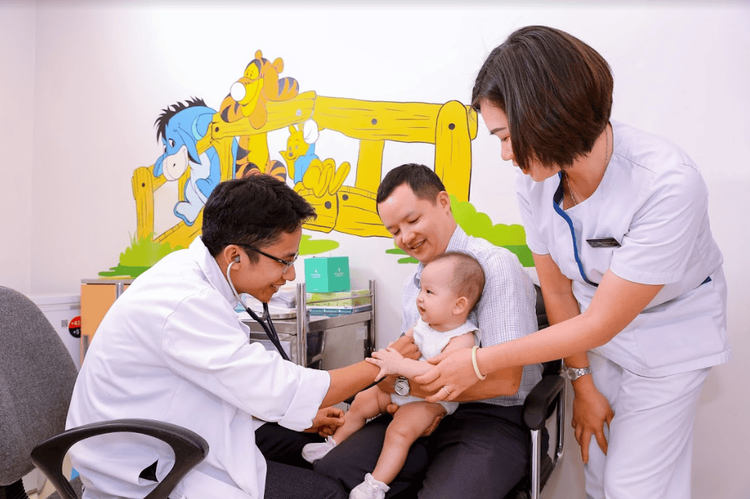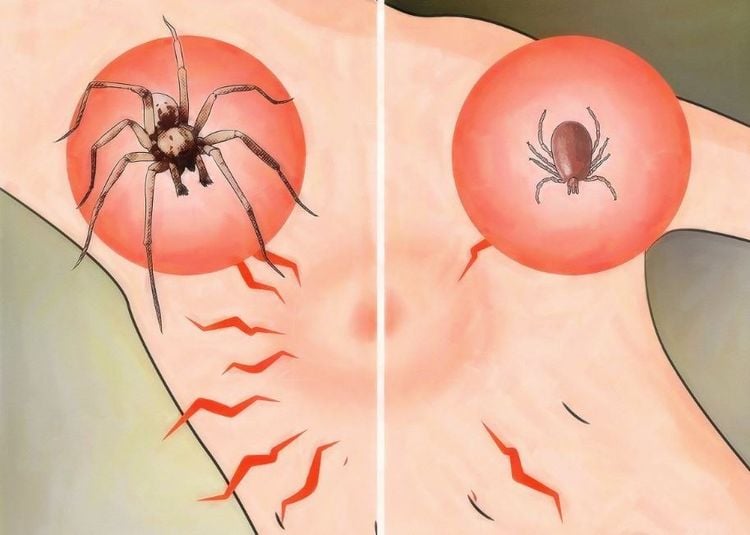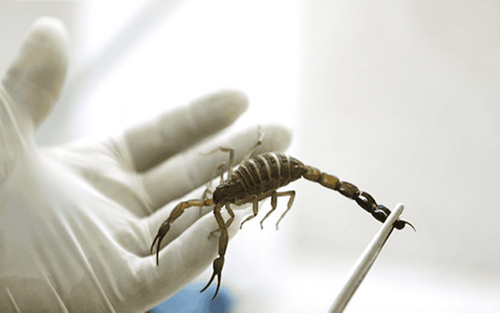This is an automatically translated article.
In most cases of children being bitten by spiders, just rinse and apply some ice. However, if the spider bite is poisonous or it is a scorpion, call 911 or take your child to the nearest hospital immediately.
1. Handling when a child is bitten by a spider
Most baby spider bites don't pose a serious risk, so there's no need to panic, but take these steps:
Wash your child's skin thoroughly with soap and water. Apply an ice pack or ice wrapped in a soft towel to reduce redness. If it is painful, give the appropriate dose of acetaminophen or ibuprofen to children 6 months of age or older. If swelling persists, ask your doctor about giving your child an antihistamine. If the swelling and redness do not improve in 1-2 days, or the child bitten by the spider shows signs of infection (heating or stinging sensation, fever), see your doctor. In case you think a spider that bites a child is poisonous, like a black widow or a scorpion, please:
Take the child to the nearest hospital as soon as possible. Or call 911 if it's faster. Try to catch the spider that bites the baby (alive or dead) and take it to the hospital. Take care so you don't get bitten. Apply an ice pack (or ice wrapped in a plastic bag) to your child's bite on the way to the hospital or while waiting for emergency services. This can help relieve pain and also slow down the effects of the venom. Note: Do not apply directly, but always cover the ice with an outer layer to protect the baby's skin. At the hospital, the doctor will monitor the temperature, pulse, breathing rate and blood pressure of the child bitten by the spider. Also possible:
Give medicine to relax muscles, relieve pain and reverse the effects of venom Do blood and urine tests Put on breathing aids if baby is having trouble breathing Chest X-ray and/or Abdominal IV IV fluids Give the child antibiotics .

Tại bệnh viện, bác sĩ sẽ tiến hành thăm khám và làm một số xét nghiệm cần thiết
2. How to know if spider bites are dangerous?
The real danger spiders are the black widow and the brown recluse. Tarantulas may look intimidating, but their bite isn't as dangerous as a bee sting.
Black Widow is glossy black and 1cm long, with long legs and a red or orange hourglass mark on the belly. When a child is bitten by a black widow spider, it will feel like a needle, and there may be slight swelling and redness at the site. Within hours, your child begins to have severe pain. Other possible symptoms include: chills or sweating, fever, nausea, and stomach cramps or abdominal pain. However, there are still cases where there are no symptoms at all.
Brown recluse spiders (sometimes called fox spiders or violin spiders) are brown, about 1cm long, with a white or dark brown violin-like mark on their back. Brown recluse spider bites will cause a slight stinging sensation. The area then becomes red and intense pain occurs for the next 8 hours. A fluid-filled blister will form at the site, followed by a deep ulcer. Other symptoms may include: chills or sweating, low-grade fever and rash, body aches, nausea and listlessness.
Relatives of spiders, scorpions, are also potentially dangerous. They are larger than spiders, about 7-8 cm long, with 8 legs and a pair of claws. In fact, scorpions look like tiny, straw-yellow lobsters with tails that curl up on their backs and have a stinger at the end. There are many different types of scorpions, but only a few are deadly. The most dangerous is the Arizona Bark Scorpion, which is light brown in color and about 2 - 4 cm long, excluding the tail. A scorpion bite causes swelling and can change the color of the skin. Other symptoms develop within minutes to 5 hours and may include: pain that worsens and radiates to the burned extremities, arm and leg twitching, pounding, grimacing.

Cần phân biệt vết cắn của nhện và một số loại côn trùng khác
3. Measures to prevent spiders from biting children
Spiders and scorpions are not aggressive, that is, they do not suddenly come to bite people. So the advice is not to panic them or touch them.
You should also:
Be careful of places spiders like to hide, like around woodpile, rock piles, in sheds and garages. Clean your home regularly to get rid of spiders and their nests, especially in closets, cupboards, basements, attics, corners, ceilings and anywhere there are webs. You can use a small, hand-held, battery-operated vacuum cleaner for easier cleaning. Most babies get bitten by insects - especially spiders - because they get into clothes or shoes. Therefore, avoid letting clothes fall on the floor. Don't forget to shake off your baby's clothes, blankets, and other personal belongings every night. Repair holes in windows and doors. Move excess stone and wood out of the house. While insect repellents won't protect your baby from spiders and scorpions, using these products is considered a "first line of defense" to avoid insect bites.
Most spider bites are harmless so you don't need to worry. The most important thing is to take care of the bitten area to reduce pain and swelling. Don't forget to keep an eye on your child's wound for the next few days. If blisters appear or begin to turn purple and infected, see your baby's doctor. Also seek medical attention if your child seems to be in severe pain or has a fever, the doctor can review the situation and prescribe antibiotics.
Children need to provide enough elemental zinc/day for them to eat well, reach the correct height and weight and exceed the standard. Zinc plays a role in affecting most biological processes taking place in the body, especially the breakdown of nucleic acids, proteins... Organs in the body when zinc deficiency can lead to a There are a number of diseases such as neurological disorders, irritability, etc. Therefore, parents need to learn about the role of zinc and guide them to appropriate zinc supplements for their children.
In addition to zinc, parents also need to supplement their children with other important vitamins and minerals such as lysine, chromium, B vitamins,... errands.
Please regularly visit Vinmec.com website and update useful information to take care of your baby and family.
Reference source: babycenter.com













